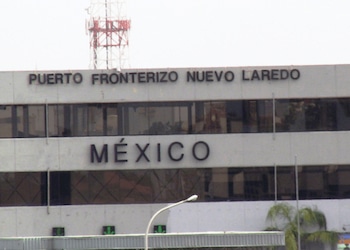Reported kidnappings have decreased significantly in Mexico, but in recent years, at least one out of every 10 kidnapping victims has been a migrant trying to reach the United States, a situation that could deteriorate further to the benefit of organized crime groups with the relaunch of a controversial US immigration policy.
Of the 1,720 kidnapping victims uncovered in operations carried out by Mexico’s National Anti-Kidnapping Unit (Coordinación Nacional Antisecuestro – Conase) between July 2019 and November 2021, around 10 percent of them were migrants from El Salvador, Guatemala and Honduras, according to official data reported by El Universal.
The true number of victims is likely far greater, especially for migrants targeted by organized crime groups, which at times collude with local police and government officials. In 2020, kidnapping crimes in Mexico had the highest rate of not being reported, or what is known as the “cifra negra,” the country’s National Institute of Statistics and Geography (Instituto Nacional de Estadística y Geografía – INEGI) reported last year.
Nationwide, the agency found that around 93 percent of crimes go unreported in Mexico. In kidnapping cases, that figure reached 98 percent in 2020. Some northern border states that serve as passageways for migrants to enter the United States, such as Tamaulipas, had rates above the national average.
SEE ALSO: Migrants Easy Prey Under US ‘Remain in Mexico’ Program
Migrant kidnappings are common in northern Mexico, but they’ve recently become another horror story for migrants returned to Mexico under the United States’ “Remain in Mexico” policy, which forces asylum seekers to wait months across the border for their US immigration court hearings.
Known officially as the Migrant Protection Protocols (MPP), former President Donald Trump first instated the policy in January 2019. Advocates have argued the initiative – as well as that of Title 42, the public health measure put in place last year amid the global COVID-19 pandemic that has effectively suspended asylum – is cruel and places migrants in unnecessary danger.
Upon taking office, President Joe Biden started to unwind MPP before officially terminating it in June 2021. However, in response to objections at the state level, a Supreme Court ruling later ordered his government to reinstate the policy. In early December, the US and Mexican governments reached a deal to restart the program along the border, first in El Paso and Ciudad Juárez, then in San Diego and Tijuana, and likely to other border towns in the coming weeks, according to the Washington Post.
InSight Crime Analysis
While Mexican criminal groups have long cashed in on transporting migrants and kidnapping those in transit north through the country, the reinstatement of MPP and the continuation of policies like Title 42 gives them another opportunity to profit from kidnapping those returned, especially in border towns rife with organized crime threats.
Migrants are especially vulnerable in the border city of Nuevo Laredo in Tamaulipas, where the line between organized crime and government security is often blurred, and at times entirely absent. The MPP relaunch hasn’t expanded to this border region just yet, but it’s likely only a matter of time before it does, according to experts consulted by InSight Crime, spelling further disaster for those sent to fend for themselves while waiting for their cases to wind through US courts.
“In my view, Nuevo Laredo has the most organized system of migrant kidnapping along the border,” said Stephanie Leutert, Director of the Central America and Mexico Policy Initiative at the University of Texas at Austin’s Strauss Center for International Security and Law.
“It’s not a ramshackle group of opportunists, this is a very well-run business,” she added.
SEE ALSO: Mexico Police Collude With Criminals to Kidnap, Extort Migrant
In Nuevo Laredo, the Northeast Cartel – an offshoot of the once-feared Zetas – has a “tight hold on migrant kidnappings,” according to a December 2021 report published by Leutert and the Strauss Center that analyzed 65 migrant kidnapping cases in the city between 2018 and 2021 during MPP and Title 42. Using their territorial control, the group capitalizes on the vulnerability of those sent back to carry out these crimes themselves, rather than taxing local groups operating there.
The subsequent ransom amounts demanded by kidnappers generally ranged between $7,000 and $10,000. After receiving payment, migrants are released and given a password. If they’re detained again, the group goes so far as reviewing its ledgers to confirm the migrant was in fact given a password and had already paid the ransom fee, Leutert told InSight Crime
“To do that, their operations have to be highly centralized. It shows the importance this group is putting on this activity,” she said.
Migrant kidnappings are an incredibly lucrative business. With the potential profits to be made, it’s no wonder why crime groups have made it such a priority. For example, if a given group kidnaps 10 people a day asking for between $7,000 and $10,000, and they average seven successful ransom payments of $5,000 per person, that’s $35,000 in profits every day.
In the first month of MPP’s reinstatement, US officials sent 267 migrants and asylum seekers back to Mexico, the majority from Nicaragua (162) and Venezuela (59), according to data collected by the Department of Homeland Security (DHS). This doesn’t include those expelled under Title 42.
Profits earned from kidnapping have other consequences as well.
“When you’re earning tens of thousands of dollars per day from migrant kidnappings, you can hire more people for payroll, corrupt more officials, purchase more weapons, ammunition, cars and other tactical infrastructure used to resist incursions from security forces and rival groups,” said Leutert.
So long as US policy continues to send vulnerable people back to border cities like Nuevo Laredo, organized crime groups can count on kidnappings for a steady revenue stream to bolster their illicit activities.

